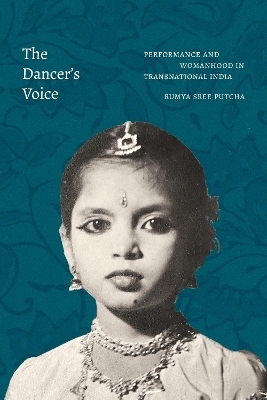
The Dancer's Voice
Performance and Womanhood in Transnational India
Seiten
2022
Duke University Press (Verlag)
978-1-4780-1649-6 (ISBN)
Duke University Press (Verlag)
978-1-4780-1649-6 (ISBN)
In The Dancer’s Voice Rumya Sree Putcha theorizes how the Indian classical dancer performs the complex dynamics of transnational Indian womanhood. Putcha argues that the public persona of the Indian dancer has come to represent India in the global imagination-a representation that supports caste hierarchies and Hindu ethnonationalism, as well as white supremacist model minority narratives. Generations of Indian women have been encouraged to embody the archetype of the dancer, popularized through film cultures from the 1930s to the present. Through analyses of films, immigration and marriage laws, histories of caste and race, advertising campaigns, and her own family’s heirlooms, photographs, and memories, Putcha reveals how women’s citizenship is based on separating their voices from their bodies. In listening closely to and for the dancer’s voice, she offers a new way to understand the intersections of body, voice, performance, caste, race, gender, and nation.
Rumya Sree Putcha is Assistant Professor of Music and Women’s Studies at the University of Georgia.
Note on Transliteration and Language ix
Prologue xi
Introduction 1
1. Womanhood 21
2. Caste 43
3. Citizenship 67
4. Silence 89
Epilogue 115
Acknowledgments 123
Glossary 129
Notes 133
Filmography 151
References 163
Index 181
| Erscheinungsdatum | 27.10.2022 |
|---|---|
| Zusatzinfo | 33 illustrations |
| Verlagsort | North Carolina |
| Sprache | englisch |
| Maße | 152 x 229 mm |
| Gewicht | 431 g |
| Themenwelt | Kunst / Musik / Theater ► Musik ► Musiktheorie / Musiklehre |
| Sozialwissenschaften ► Politik / Verwaltung ► Politische Theorie | |
| Sozialwissenschaften ► Soziologie | |
| ISBN-10 | 1-4780-1649-3 / 1478016493 |
| ISBN-13 | 978-1-4780-1649-6 / 9781478016496 |
| Zustand | Neuware |
| Informationen gemäß Produktsicherheitsverordnung (GPSR) | |
| Haben Sie eine Frage zum Produkt? |
Mehr entdecken
aus dem Bereich
aus dem Bereich
Grundbegriffe, Harmonik, Formen, Instrumente
Buch | Softcover (2021)
Philipp Reclam (Verlag)
CHF 15,90
ein reisender Virtuose erzählt
Buch | Softcover (2025)
Butz, Josef, Dr. (Verlag)
CHF 25,20


